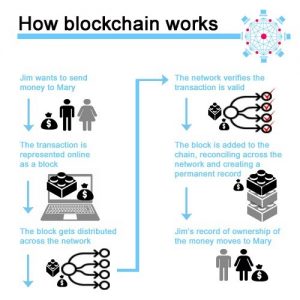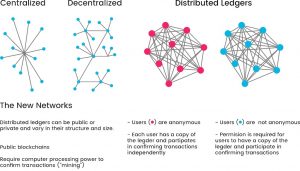Blockchain was invented by Satoshi Nakamoto in 2008 to serve as the public transaction ledger of the cryptocurrency bitcoin. In simple words, its a digital ledger” stored in a distributed network.
A blockchain is a growing list of records, called blocks, which are linked using cryptography. Blocks hold batches of valid transactions that are hashed, encoded, are readable by the public and are widely used by cryptocurrencies (Digital Asset). It can create a value in the coming era of decentralization, China expected to become global blockchain superpower by 2023.
By design, in blockchain modification of the data is not possible. It is "an open, distributed ledger that can record transactions between two parties efficiently in a verifiable & permanent way. A blockchain is managed by a peer-to-peer network collectively following protocols for inter-node communication. Once recorded, the data in any given block cannot be altered without alteration of all subsequent blocks, which requires consensus of the network majority.
Leading the way is Stanford University which offers 10 blockchain-based courses. Cornell University has become the second place by offering nine and and the University of Pennsylvania the third to offer six blockchain courses. The National University of Singapore placed fourth on the list with five courses, and the Swiss Federal Institute of Technology Zurich came in seventh, with three courses.
Courses are not limited to computer sciences as one might think. Rather, they are being offered across a range of disciplines like blockchain.
This has been a growing trend, back in 2014 NYU Stern (the university’s business college) launched a cryptocurrency course, with the help from David Yermack. However, the field of academia has come a long way since then, with NYU now being ninth on the list, offering two cryptocurrency and blockchain courses.
How does Blockchain works? Lets understand by the help of a diagram:
Matt Blaze, a cryptography researcher and an associate professor at the University of Pennsylvania, has been critical of academia’s crypto-invasion. “I’m puzzled by demand for degree programs in blockchain,” he said on Twitter. “It’s like having a degree in binary search trees, an at least equally important and interesting data structure.”
If you want to change the world on the blockchain then it’s all about building an open protocol, not just another startup.
In India, the trend of investing into cryptocurrency is seen in recent few years. We yet have to see whether our Educational System would allow it to be included as a course or not.
Read More about Cryptocurrency: Click Here
I hope you like my blog. Thanks a ton for reading it. Do mention your comments, suggestions & feedback below.
Ajey Kumar Gupta
(Exchange Admin).
Next blog: Paytm’s Made In India AI Cloud; Amazon, Google oppose Data Localisation!
A blockchain is a growing list of records, called blocks, which are linked using cryptography. Blocks hold batches of valid transactions that are hashed, encoded, are readable by the public and are widely used by cryptocurrencies (Digital Asset). It can create a value in the coming era of decentralization, China expected to become global blockchain superpower by 2023.
By design, in blockchain modification of the data is not possible. It is "an open, distributed ledger that can record transactions between two parties efficiently in a verifiable & permanent way. A blockchain is managed by a peer-to-peer network collectively following protocols for inter-node communication. Once recorded, the data in any given block cannot be altered without alteration of all subsequent blocks, which requires consensus of the network majority.
Top Universities have included it in their Curriculum:
Eight out of top 10 universities offer blockchain courses are based in the US, according to a new report compiled by popular cryptocurrency exchange Coinbase. Research has broadly uncovered that 42 % of the world’s top universities offer at least one Academically Endorsed Course.Leading the way is Stanford University which offers 10 blockchain-based courses. Cornell University has become the second place by offering nine and and the University of Pennsylvania the third to offer six blockchain courses. The National University of Singapore placed fourth on the list with five courses, and the Swiss Federal Institute of Technology Zurich came in seventh, with three courses.
Courses are not limited to computer sciences as one might think. Rather, they are being offered across a range of disciplines like blockchain.
This has been a growing trend, back in 2014 NYU Stern (the university’s business college) launched a cryptocurrency course, with the help from David Yermack. However, the field of academia has come a long way since then, with NYU now being ninth on the list, offering two cryptocurrency and blockchain courses.
What value does Bitcoin have?
One bitcoin is a single unit of the Bitcoin (BTC) digital currency. Just like a dollar, a bitcoin has no value by itself; it has value only because we agree to trade goods and services to bring more of the currency under our control, and we believe others will do the same.Why Is It Called Blockchain?
A block is record of a new transactions. When a block is completed, it’s added to the chain. Bitcoin owners have the private password (a complex key) to an address on the chain, which is where their ownership is recorded. Crypto-currency proponents like the distributed storage without a middle man — you don’t need a bank to verify the transfer of money or take a cut of the transaction.
How does Blockchain works? Lets understand by the help of a diagram: 
Why there is such a demand to gain knowledge in courses of this nature?
Top Universities put up their strong point stating in academics, at least we can hope to see blockchain graduates approaching the field with a critical eye, supported by a strong foundation of knowledge, and rationality.Matt Blaze, a cryptography researcher and an associate professor at the University of Pennsylvania, has been critical of academia’s crypto-invasion. “I’m puzzled by demand for degree programs in blockchain,” he said on Twitter. “It’s like having a degree in binary search trees, an at least equally important and interesting data structure.”
If you want to change the world on the blockchain then it’s all about building an open protocol, not just another startup.
In India, the trend of investing into cryptocurrency is seen in recent few years. We yet have to see whether our Educational System would allow it to be included as a course or not.
Read More about Cryptocurrency: Click Here
I hope you like my blog. Thanks a ton for reading it. Do mention your comments, suggestions & feedback below.
Ajey Kumar Gupta
(Exchange Admin).
Next blog: Paytm’s Made In India AI Cloud; Amazon, Google oppose Data Localisation!


0 comments:
Post a Comment